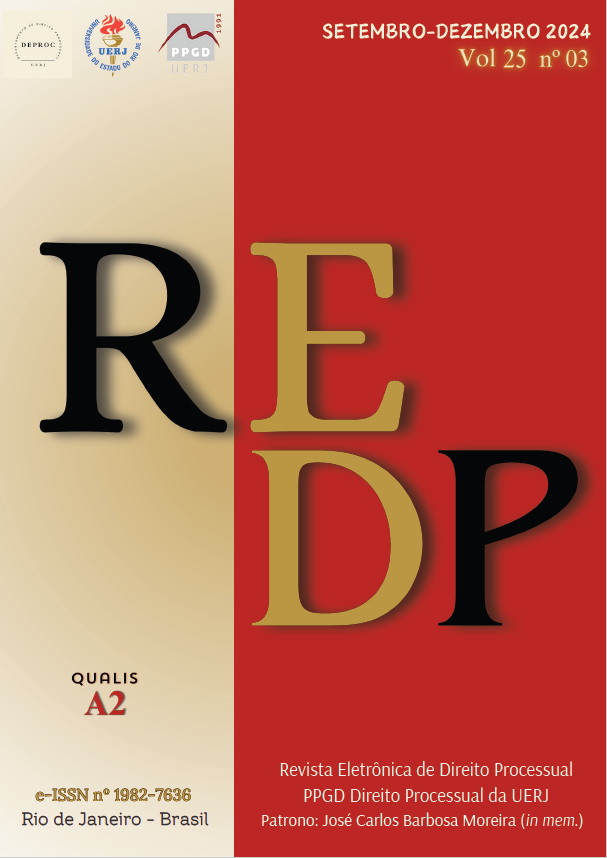O DIREITO À PRODUÇÃO PROBATÓRIA E O CONTRADITÓRIO COMO DIREITO DE EFETIVA PARTICIPAÇÃO NO PROCESSO
DOI:
https://doi.org/10.12957/redp.2024.86589Resumo
O objetivo pretendido é verificar se a produção probatória deve se dar na conformidade das circunstâncias do caso levado à análise, na medida em que uma parte pode realizar uma determinada prova, de acordo com as possibilidades probatórias ao alcance das respectivas partes e pela característica dos fatos, e se tal questão tem conexão com o direito ao contraditório, visto como direito de efetiva participação no processo, com possibilidade de influência na formação dos provimentos jurisdicionais. O artigo se contextualiza numa eventual releitura do princípio constitucional do contraditório, assim como no fato de não ser achar, em doutrina, um trato a respeito do artigo 369, do Código de Processo Civil, no qual se leve em conta a abordagem ora proposta. Leva-se em consideração que a parte (artigo 369, do Código de Processo Civil) tem o direito a empregar todos os meios para influenciar na convicção do magistrado. O referido dispositivo legal afirma ser direito das partes empregar os meios existentes para influenciar no resultado final do processo. O direito à prova é posto pelo texto legal como mecanismo para as partes influenciarem no feito judicial. Essa tomada de concepção é o lugar em que se conecta o contraditório (como viabilização da participação no processo) com o desarrolhar do direito à prova. Como resultado da pesquisa feita, viu-se que há na legislação determinadas previsões que exigem comprovações específicas, como no artigo 2ª-A, parágrafo único, da Lei 8.560/1992, no artigo 579; no artigo 604, inciso III; bem como no artigo 753 do Código de Processo Civil, também se viram exemplos colhidos a partir de julgados de Tribunais brasileiros. Atualmente há mais meios tecnológicos para influenciar no deslinde de questões fáticas submetidas a juízo. A conclusão é de que a redação empregada no artigo 369, do Código de Processo Civil, ligada ao fato de se viver numa sociedade na qual mais provas podem ser coletadas, parece fazer uma mudança de contexto para as tarefas a serem realizadas no mister probatório dentro do contexto processual. Quanto à metodologia, o trabalho é descritivo em relação aos fins. Em relação aos meios, a pesquisa foi, bibliográfica, na consulta de livros e artigos científicos, e exploratória, pois contou com análise de julgados dos Tribunais brasileiros para verificar a aplicabilidade da ideia levantada.
Downloads
Publicado
Como Citar
Edição
Seção
Licença
Copyright (c) 2024 Américo Bedê Freire Júnior, Vladimir Cunha Bezerra

Este trabalho está licenciado sob uma licença Creative Commons Attribution 4.0 International License.
Todos os artigos publicados na Revista Eletrônica de Direito Processual (REDP) (Departamento de Direito Processual, Universidade do Estado do Rio de Janeiro, Brasil) são licenciados por meio de uma Licença Creative Commons - Atribuição 4.0 Internacional (CC BY 4.0).
Os autores retêm os direitos autorais de seu artigo e concordam em licenciar seu trabalho com a licença CC BY 4.0, aceitando assim os termos e condições específicos desta licença disponíveis no seguinte website: https://creativecommons.org/licenses/by/4.0/legalcode.
- Os autores concedem à REDP o direito de primeira publicação, de se identificar como publicadora original do trabalho e concedem à revista uma licença de direitos não exclusivos para utilizar o trabalho das seguintes formas: Reproduzir, vender e distribuir cópias eletrônicas ou impressas do manuscrito como um todo, de partes específicas do manuscrito e de suas traduções para qualquer idioma;
- O uso do artigo por terceiros é livre, contanto que a integridade da publicação seja mantida e seus autores originais, periódico de primeira publicação e detalhes de citação sejam identificados.
Dentro dos termos da licença, os autores podem entrar em acordos contratuais adicionais separados para a distribuição não exclusiva da versão publicada do trabalho na revista.
Copyright and Licensing
All articles published in the Procedural Law Electronic Review (REDP) (Department of Procedural Law, State University of Rio de Janeiro, Brazil) are licensed under a Creative Commons License - Attribution 4.0 International (CC BY 4.0).
- Authors retain copyright to their article and agree to license their work under the CC BY 4.0 license, thereby accepting the specific terms and conditions of this license available at the following website: https://creativecommons.org/licenses/by/4.0/ legal code.
- Authors grant REDP the right of first publication, to identify itself as the original publisher of the work, and grant the journal a non-exclusive license to use the work in the following ways: Reproduce, sell and distribute electronic or printed copies of the manuscript as a whole, of specific parts of the manuscript and its translations into any language;
- Use of the article by third parties is free, as long as the integrity of the publication is maintained and its original authors, first publication journal, and citation details are identified.
Within the terms of the license, authors may enter into separate additional contractual agreements for the non-exclusive distribution of the published version of the work in the journal.




